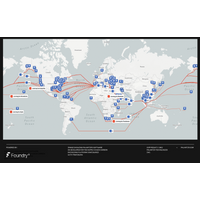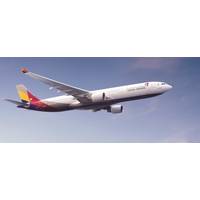Biden Administration will not finalize the clean fuel tax credit guidelines
Three sources have confirmed that Biden administration officials won't finalize the highly anticipated guidelines for new clean fuel production credits targeted at the airline industry and biofuel industries by the time they depart in January. This casts doubt on the future success of this key part of the U.S. President's climate agenda. The tax credit was to go into effect on Jan. 1 but, due to a lack detailed guidelines from the U.S. Treasury, it would have been rendered dormant. The global emissions of greenhouse gases from air travel are around 2.5%, which makes it an important target in the fight to combat climate change.
Palantir, Trafigura to Track Carbon Emissions for Oil, Metals industry

Palantir Technologies Inc and global commodities trader Trafigura have set sights on a new market, their chief executives told Reuters on Monday: tracking carbon emissions for the oil, gas, refined metals, and concentrates sector.The companies are building a platform for oil majors and other commodities firms to vet the environmental impact of their supply chains, applying Trafigura's data to Palantir's operating system, known as Foundry.The effort represents a potentially lucrative long-term opportunity at a time when Palantir's revenue outlook has fallen short of expectations…
Navy Tests 100-percent Advanced Biofuel
Secretary of the Navy Ray Mabus' energy vision came to fruition in September when the EA-18G "Green Growler" completed flight testing of a 100-percent advanced biofuel at Naval Air Station Patuxent River, Maryland. "From takeoff to landing, you couldn't tell any difference," said Lt. Cmdr. Bradley Fairfax, project officer and test pilot with Air Test and Evaluation Squadron (VX) 23, after the first test flight Sept. Using the Naval Air Warfare Center Aircraft Division's (NAWCAD) Real-time Telemetry Processing System (RTPS) at the Atlantic Test Ranges, flight test engineer Mary Picard monitored the ground and test flights and confirmed Fairfax's observations.
EPA Moves to Regulate Aircraft Emissions
The U.S. Environmental Protection Agency on Wednesday said greenhouse gases from aircraft endanger human health, taking the first step toward regulating emissions from the domestic aviation industry. The EPA's endangerment finding kicks off a process to regulate greenhouse gas emissions from the aviation industry, the latest sector to be regulated under the Clean Air Act after cars, trucks and large stationary sources like power plants. The finding allows the EPA to implement domestically a global carbon dioxide emissions standard being developed by the International Civil Aviation Organization (ICAO). The U.N.
Lower Prices Blunt Drive for Efficiency: Kemp
For a decade, high and rising prices have created a strong incentive to use oil-derived fuels more sparingly. By the end of 2012, efficiency improvements, substitution, and changes in behaviour had cut oil consumption in the advanced economies by 8 million barrels per day (bpd) compared with the pre-2005 trend, according to James Hamilton at the University of California ("The changing face of world oil markets" July 2014). Today, consumption of petroleum products in the United States is 1.8 million b/d (9 percent) lower than it was in 2005, even though the population has increased by 23 million and real economic output is up almost 14 percent since then, according to U.S.
France to host airshow-style nuclear exhibition
France hopes to boost its nuclear industry with a biennial exhibition modeled on the Paris Air Show, although it does not expect reactor orders to pile up as fast as airplane contracts. To be held in the same Le Bourget venue as the airshow, the October 14-16 World Nuclear Exhibition (WNE) expects some 7,000 visitors will visit stands representing nearly 500 French and foreign nuclear industry companies, the organisers said on Thursday. "Obviously, it would be an illusion to expect to sign as many nuclear reactor contracts there as the airline industry does at the airshow," WNE chief Gerard Kottmann told reporters.
Asia Airlines Hedging Big Part of Fuel Use

Top Asian airlines are hedging a substantial portion of their jet fuel usage this year, a Reuters survey showed, signaling they expect prices of the fuel to be firm and indicating sustained pressure on their profit margins. Jet fuel makes up at least 30 percent of most airlines' overall operating costs and an effective hedging strategy is crucial as heightened competition forces carriers to cut fares and operate on thin margins. While there should be sufficient supply of jet fuel in Asia this year to meet buoyant demand driven by healthy passenger traffic, airlines are unlikely to benefit from lower prices.
